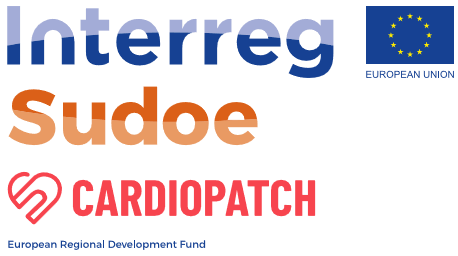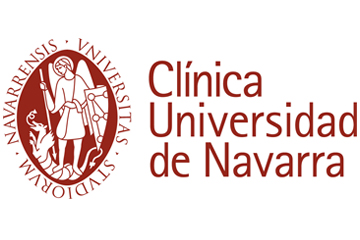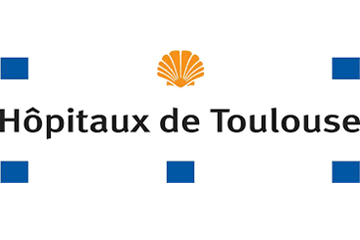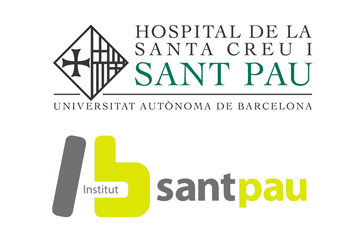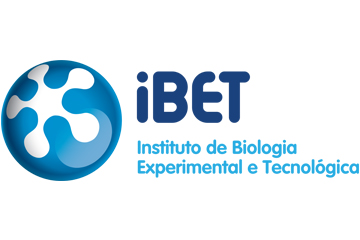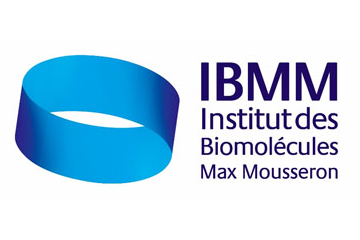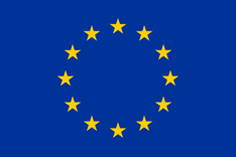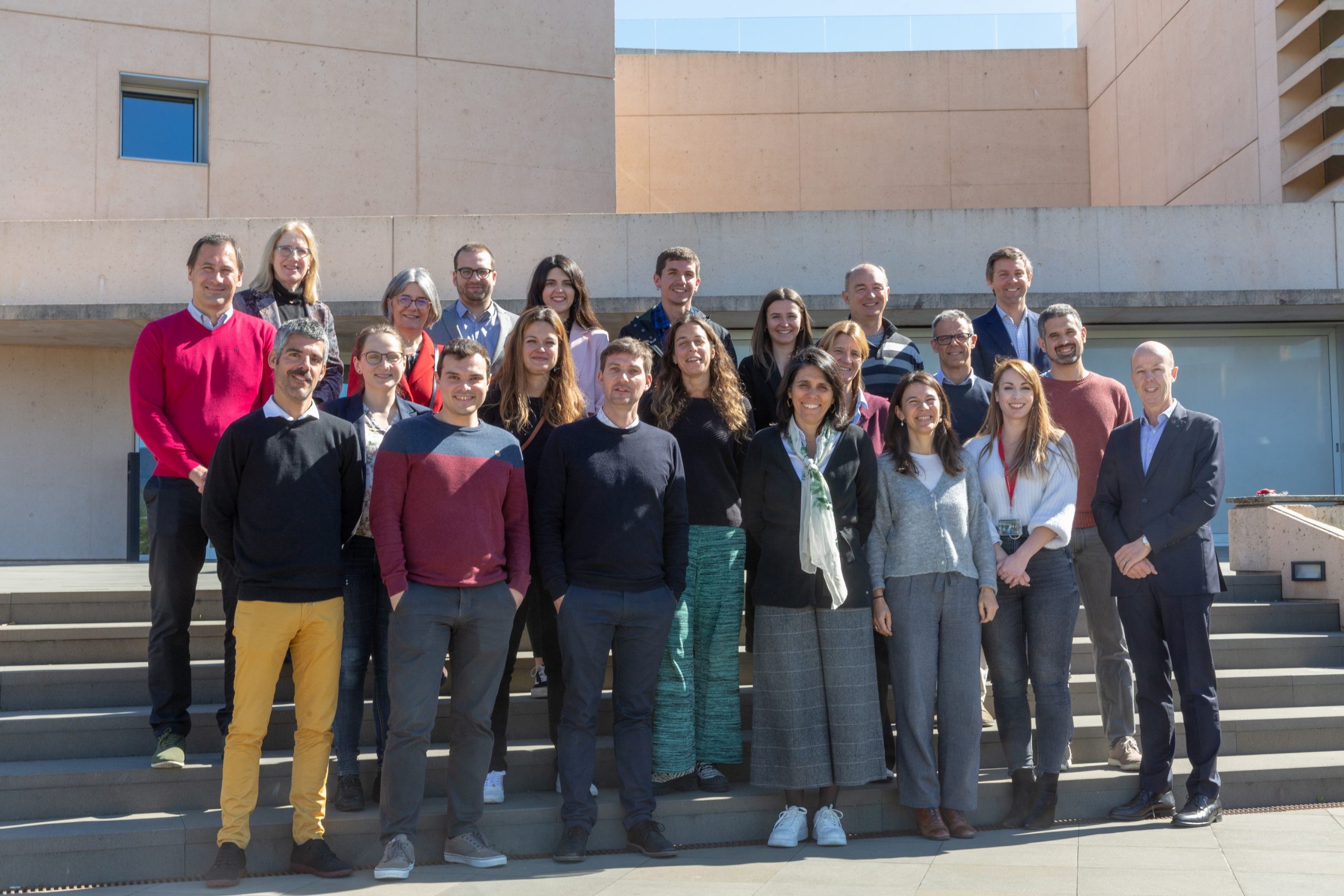Project Partners
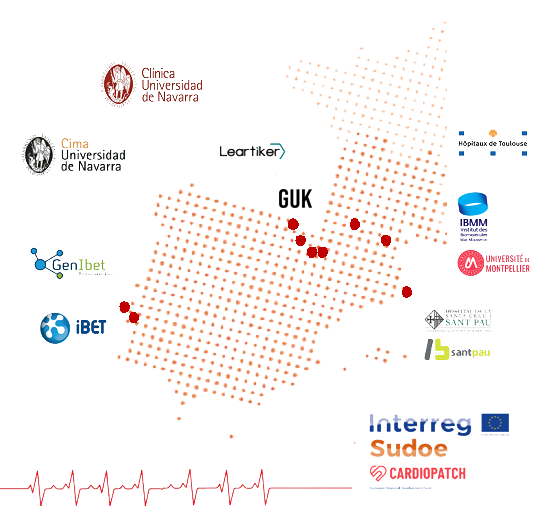
CARDIOPATCH is fostered by 9 different partners from 6 different regions of Spain, France and Portugal.
In line with the multidisciplinary spirit of the project, the consortium includes hospitals, universities, SMEs and research centers.
Here you can find information about all of them
Fundación para la Investigación Médica Aplicada (FIMA) was constituted in 1998, and is the owner and responsible for the management of the Center for Applied Medical Research (CIMA). The Fundación has its own legal status, is a non-profit research organisation and has as social aim the promotion of initiatives which encourage basic clinical research in areas of health and biomedicine to contribute to benefit of public through technological advances and innovation.
CIMA’s research is distributed in different Programmes, but the core Programme related to the project relays Regenerative Medicine Programme. Goals are to achieve biomedical excellence with a translational research emphasis for the benefit of the patient. CIMA is the only private research center in Spain that combines solid basic biological science with early preclinical drug development capabilities within the context of clinical patient care. All is oriented to solve unmet medical problems for the benefit of the patient and the society.
The Regenerative Medicine Programme comprises a multidisciplinary team of biochemists, veterinarian and clinical researchers. The group has long-standing experience in stem cell therapies (Mesenchimal Stem Cells and iPS Cells derivation, growth, genetic-modification and differentiation), bioengineering (preparation of cellular patches), implementation of nanotherapies as well as small animal models of myocardial disease.
CIMA will contribute to develop work package 5, in order to in vivo test the therapeutical potential of the different cellular and/or functionalized patches and select the best one for being applied in a large pig infarct model, as a previous step to the clinics. CIMA will be also responsible for the Transversal work package 3, by facilitating communication among groups and assuring the good progress of the project.
Contact person:
Email:
Website:
CARDIOPATCH project is coordinated by the University Clinic of Navarra (CUN). CUN is a reference centre in Spain for several procedures, including Regenerative Medicine strategies. It belongs to the University of Navarra (UNAV), a non-profit private university based in Pamplona, Spain.
The Cellular Therapy Area (CTA) comprises a multidisciplinary team of basic and clinical researchers. CTA vision is to deliver new frontline treatments through interdisciplinary research into basic disease mechanisms and the application of novel therapeutic approaches and technology. The expertise of CTA includes state-of-the-art stem cell know-how (hiPSC derivation, growth, gene editing and differentiation), NGS (single cell and bulk RNAseq, ATACseq, ChiPseq, etc.) as well as small and large animal models of disease amongst others.
Besides the leadership of the project, CUN will coordinate two work packages, work package 1 (CARDIOPATCH‘s platform) and work package 3 (Promotion of synergies between health and 3D printing sectors and improvement of current RIS3 strategies in Health).
At scientific level, CUN will be involved in the work package 5 being in charge of determining the therapeutic potential of the cellularized and/or functionalized patches in a porcine preclinical model of MI.
Contact person:
Email:
GenIbet Biopharmaceuticals is a GMP Contract Development Manufacturing Organization (CDMO) offering highly specialized GMP manufacturing and development services to research groups, Biotech and Pharma companies. GenIbet core activity is the manufacture and supply of materials for use in early stage drug development, pre-clinical studies and GMP manufacturing for clinical trials. GenIbet runs projects within a very broad spectrum, including not only Cell and Gene Therapy products, but also Recombinant proteins, Vaccines, RNA and Live Microbial Products. GenIbet team has experience with mammalian, avian and insect cells, Bacteria & Yeasts and Viruses and a proven track record with A549, CAP, CHO, EB66, HEK293, SF9, MDCK, Vero, E. Coli, Pichia Pastoris, Baculovirus and Adenoviruses. Our mission is to manufacture safe and reliable breakthrough products to support worldwide costumers on building the therapies of the future. We offer a unique combination of strict GMP compliance and troubleshooting/problem solving mindset which is crucial for early stage product development and believe on tailor made solutions for each specific product. GenIbet will be involved in work package 5 providing Guidance and Regulatory Support to assure compliance of the protocols developed within WP3 for stem cells and extracellular vesicles to be used as new therapeutic products with the ATMPs manufacturing regulatory requests.
Contact person:
Email:
Website:
GUK is a communication agency specialized in the development of communication and marketing strategies for science, technology and R&D projects and has broad experience in the communication of international projects driven by companies, research institutes, technology centers and universities. GUK is currently collaborating with different European projects included in the H2020 program such as ROMEO, REZBUILD, BLOCKCHERS, NAIMA, VES4US or Waste4think. As the communication partner of the CARDIOPATCH project, the firm will be in charge of the communication strategy and dissemination of the results of the initiative. In addition to its consolidated track record in communicating R&D projects, GUK has extensive experience in the field of public relations, content development, social networks management and it is also a pioneer in the area of Inbound Marketing, a discipline in which it has been an official Hubspot partner since 2015.
Contact person:
Email:
Website:
The Toulouse University Hospital (CHUT) is one of the ten French University Hospitals with a Clinical Investigation Centre (CIC) in Biotherapy (CIC BT). The CHUT is the sponsor of several studies of cellular and gene therapies, mostly in the cardiovascular field. The proximity of the Institute of Metabolic and Cardiovascular Diseases (I2MC) has led to the development of several research projects that have been implemented in clinical trials. Our expertise and positioning, at the interface of basic research and hospital clinical services, allow us to support translational research projects, i.e. regulatory preclinical studies conducted on animal models following the Good Laboratory Practice (BPL), the design of clinical studies, the search for regional, national and European funding as well as regulatory steps to obtain regulatory approvals to conduct clinical trials. We participate in WP2 in tasks to build, validate and produce lenti-vectors encoding a combination of angiogenic and cardioprotective factors, in order to genetically modify adipose tissue-derived mesenchymatous stem cells (ADSCs). These cells will be characterized in vitro as to their therapeutic potential and then forked out to other members of the CARDIOPATCH network for large-scale production and the development of a 3D cardiac ischemia treatment. This WP will be conducted with the SUSINI/PRATS team of I2MC which is our recognized historical academic partner in the field. We will also participate in the WPs 5, 6 and 7 aiming to develop these products derived from research for use in clinic, preclinical studies with a view to design clinical studies of first injection to humans but also to reflect on the positioning and development of these products until they are registered by the competent authorities.
Contact person:
Email:
The Research Institute of the Hospital de la Santa Creu i Sant Pau (HSCSP-IR) was created on 4 June 1992 as a private scientific foundation. Its mission is to promote basic, clinical, epidemiological and healthcare research in the health science and biomedical fields, with the ultimate aim of improving the health of the population. On 10 December 2003, the Autonomous Government of Catalonia approved affiliation of the HSCSP-IR as a University Research Institute attached to the Autonomous University of Barcelona (UAB).
In CARDIOPATCH project, the Research Institute of Hospital de la Santa Creu i Sant Pau (HSCSP-IR) will comparatively assess the therapeutic effect of the different combinations of patches created (functionalized or not and seeded with the different types of preconditioned ADSC and cardiac derived cells) and their mechanisms of action in order to choose the one/s with greatest benefit on the heart.
This work will be staged in four main research lines within the work package 5: First, in vitro comparison of the bio activity of the different cell patches. Secondly, determination of their benefit in a chronic model of MI in rats to select the best patch. In the third place, determination of functional improvement and the mechanisms of cellular action after patch’s implantation in a pig model with dyslipidemia subjected to MI and finally, prepare the publications.
Contact person:
Email:
Website:
Instituto de Biologia Experimental e Tecnológica (iBET) is a private non-profit research intensive institution with over 30 years of experience in developing innovative biopharmaceutical solutions. Key areas of expertise include the bioprocessing and in depth, characterization of Advanced Therapeutic Medicinal Products (ATMPs) such as stem cells and viral vectors for cell and gene therapy. iBET is a leading institution in the development of advanced cell models for pre-clinical research and regenerative medicine. iBET investment in the development of 3D culture systems spans for more than 20 years, competences covering areas such as liver, central nervous systems, cancer and cardiac tissue. In particular, the iBET team has been developed novel cell culturing strategies that recreate the appropriate environmental conditions excelling growth and/or differentiation/maturation of pluripotent and adult stem cells of human origin. iBET also contributes significant experience in the integration of Omics approaches such as proteomics, transcriptomics, metabolomics and fluxomics, supported by state-of-the-art MS technologies, as complementary analytical tools to bioprocess optimization and product characterization. iBET’s role in CardioPatch project is the production and characterization of clinically relevant cells (ADSC and hiPSC-CM) and their derivatives (e.g. EV/Exosomes) for development of Cardiac Patches, and the coordination of activities related to the “Generation of different Patch Models” (work package 4) whose safety and efficiency will be subsequently assessed in animal models.
Contact person:
Email:
Website:
The Institute of Biomolecules Max Mousseron (IBMM) is partner of the CARDIOPATCH project IBMM is a research institute of international renown with research activities on essential biomolecules and biopolymers. It belongs to the University of Montpellier (UM), the French National Centre for Scientific Research (CNRS) and the « Ecole Nationale Supérieure de Chimie de Montpellier » (ENSCM). The Department of Polymers for Health and Biomaterials (PHBM) of IBMM is a multidisciplinary research group dedicated to polymers related to biomedical applications. The group designs, synthesizes, characterizes, and processes polymers to meet the requirements of therapeutic applications. PHBM is recognized worldwide for its expertise in degradable polymers and polymeric biomaterials for health applications with four main topics: Advanced Polymeric Biomaterials, Polymers for Tissue Engineering & Medical Devices, Polymers for Drug Delivery and Polymers for Diagnostic. PHBM will be associated to all transversal work packages of the project and at a scientific level, will be involved in work package 4 (Generation of the different patches) with as main objective to propose functionalized patches.
Contact person:
Email:
Leartiker S.Coop in a sectorial Technological Centre belonging to RVCTI (Red Vasca de Ciencia, Tecnologia e Innovación) located in Markina-Xemein specialized in Food Technology and Polymer Technology, with more than 10 years of collaborations with companies in the health sector, Hospitals and the Basque Health Service. Leartiker Polymer Technology has two main specializations; SUSTAINABLE TRANSPORT, which is focused on the comprehensive development of reliable, lightweight and quiet polymer structures, and HEALTH, focused on the development of polymer structures in POC, Tissue Engineering and medical devices. Leartiker HEALTH is positioned as an expert agent in materials and processes associated with the areas of rapid diagnosis, regenerative medicine, and medical device’ design and development, offering its scientific knowledge both to different hospitals and to companies in the health sector, and collaborating with them to generate knowledge and new products that dynamize the health sector in our environment. In CARDIOPATCH, Leartiker will work mainly on the development of the 3D system for the patch’ culture and transport (WP6), as well as, on the development of a rollable dispositive for the patch’ implantation (WP7). Apart from being leader of those two work packages, Leartiker will also leader the WP2, where the sustainability of the network will be carry out, together with the transfer and the exploitation of the products.
Contact person:
Email:
Website:
